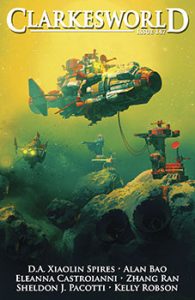Karen Burnham Reviews Short Fiction: Strange Horizons, Clarkesworld, and Beneath Ceaseless Skies
 Strange Horizons 12/18
Strange Horizons 12/18
Clarkesworld 12/18
Beneath Ceaseless Skies 12/6/18, 12/20/18, 1/3/19, 1/17/19
Strange Horizons starts December with a unique tale of imprisonment. In “How Pleasant the Red Bloom” by Lucy Harlow, the narrative literally wars with itself, as a well-mannered voice that writes in complete and elaborate sentences is edited and interrupted by a voice that seems deranged. It becomes clear that the first speaker is incarcerated in a deep well of sorts, and as the story progresses we learn the nature of their transgression and the relationship between the two voices. I love how every sentence and edit evolves and builds to get the desired effect: chilling. “Sequestration; Vitrification” by Allison Jamieson-Lucy is more of a slice-of-life tale focusing on the intersection of science, art, and activism. In a future where limited nuclear weapons have been used once more, Lynn is a scientist working on making diatoms (microscopic lifeforms) robust enough that they can eat nuclear waste and store it in a more benign form. She attends a gallery showing by an artist friend, whose boyfriend is suffering through radiation treatments for cancer. Her housemates are going on an anti-nuclear proliferation protest march and invite her to come along. In a way, all of them worry that they’re never going to make a difference, never going to stop the world-consuming crises that are looming, but they’re all going to try anyway – through art, through science, and through activism. A quiet tale, but quite apt.
My favorite story in December’s Clarkesworld is “Bringing Down the Sky” by Alan Bao. The story starts in China in a near future so polluted that any clean air is worth bottling and exporting. The tale spirals outward from there, providing us with a number of viewpoints, starting with a boy who has to hike to where the air is clear, to Americans working different business angles, out to America and the corporations, investors, and PR flaks working in the business, and then back to China as the corporations start to shift the business model around them. I appreciated the 360-degree perspective around a near future proposition, showing off many more angles than might usually be captured in a single story.
Two other stories stood out: for their immensely fabulous premises, the fascinating way in which their possibilities unfold, and the ways in which I found their endings unsatisfying. “When We Find Our Voices” by Eleanna Castroianni gives us a far future inhabited by human men who have managed to (accidentally) eradicate all human women. They form an oppressively exploitative relationship with the gru, a bird-like species with three sexes. When human men mate with the male or female of the species, the resulting genetic mix is spun into an egg by a member of the third sex (etu), and can produce either another gru or a human boy. We follow the etu Keredi and their male partner Nyalu as they live through the years this cycle takes. Keredi works as best they can within the society, but Nyalu ventures out and makes discoveries about the nature of the human exploitation of the gru. The ending comes with a dramatic climax, a revolution about to begin – but without a denouement that might suggest success or failure or what the cost of either might be.
“Master Zhao: The Tale of an Ordinary Time Traveler” by Zhang Ran (translated by Andy Dudak) is in some ways even worse. The story brilliantly reveals the story of Master Zhao, a man whose brain often reaches into different potential futures, only to snap back to his present. He feels like he lives through thousands of different lives and never knows if he’s on the “main branch” or on a path that will eventually snap back. He befriends Master Zhang (the narrator/author) and tells him his story over takeout food and beer, while Zhang gets more and more excited the more he hears. The way the story unfolds, getting stranger and stranger with our understanding of Zhang’s gift/curse gradually evolving, is superlative. At the end of the story there are multiple possibilities in play, and we know that the swirling potentials will resolve at 8:45 p.m. The story ends at 8:40 p.m., which I found deeply unsatisfying given how much I’d been drawn into the mystery. Both this story and Castroianni’s are amazing stories that are well worth your time, but I can’t help feeling that neither chose quite the right moment to stop.
“Forest Spirits” by Michael J. DeLuca in Beneath Ceaseless Skies #266 feels similar to me in terms of endings. The story gives us two artists running away from a city where they have just used a festival production to speak truth to power, telling how the magic seeds that power the city’s industry and prosperity are wrecking the environment around them. We learn about the world and the character backgrounds, but the story ends just as the pursuers are closing in on them. Do they survive, do they go out in a blaze of glory? Does their message make a difference? That is left entirely to the reader’s imagination. (If we look beyond this story to our wider world, its premise may seem particularly relevant to our Anthropocene era. If that speaks to you, I would like to bring the annual journal Reckoning to your attention. Not purely speculative, its subhead is “creative writing on environmental justice,” and it is edited by our own Mr. DeLuca.)
Continuing with BCS, “Forest Spirits” is paired with “Frozen Meadow, Shining Sun” by Emily McCosh. A young girl is concerned when her older sister disappears, and she suspects that the kitsune wedding the sister took her to when she was young has something to do with it. She learns more about her family history as the village deals with the crisis, and in the end makes her choice about which path to follow.
Beneath Ceaseless Skies #267 starts with a great adventure story, “A Martyr’s Art” by J.P. Sullivan. In this world a person can wake up one day with Amra’s Mark. At that point they become a Martyr, one who can take others’ wounds and illnesses upon themselves, leaving the beneficiary perfectly healed and the Martyr suffering. Martyrs are assigned to the powerful of the city, of course. We meet Chalcedony as she is observing her master being entirely outmatched in a duel with the Dockmaster, waiting to heal him as needed. As the story unfolds we learn why that duel was important and what ship’s cargo is worth dying for – something that might change the balance of power in the Martyr’s world. There is swashbuckling and operas and an exploration of just how abusive the lords are of the Martyr’s powers.
Moving into January, Issue #268 gives us “The Blighted Godling of Company Town H” by Beth Cato, in which a munitions factory has been shuttered after a war ends. The godling who protected the factory and the inhabitants of the surrounding town is reduced to fashioning small protective icons out of leftover company paperwork. She is summoned outside when some of her icons are Unmade by an outside force, and the town has to decide how to face an existential threat to their already diminished existence. Another suffering village features in Morgan Al-Moor‘s “The Beast Weeps with One Eye“. This group has been driven from their African home by a swarm of murderous ravens, and only finds refuge in the land of the King of Sorrows. Our point-of-view character is their wise High Sister, as she deals with a god who does not have their best interests at heart. We learn more of his backstory as he inflicts sufferings on her people that mirror his own, and she has to fight off despair so that her people can thrive.
“The Deepest Notes of the Harp and Drum” by Marissa Lingen in BCS #269 is a story with a nice twist on a classic fantasy trope. Jane, a woman who murdered her sister and fed her to wild boars, is terrified of being found out when local musicians turn up with instruments made of boar hide and bones. The spirits of the boars have more porcine concerns to intone to the audience and make no mention of murders or corpses, but Jane lives in fear that they might decide to bring it up someday. When she falls in love with another woman, who is in similar circumstances related to a wooden flute made out of a particular tree, they come up with a plan to avoid any possibility of future revelations by all-too-talkative instruments. The issue finishes with “La Orpheline” by Jordan Taylor. This highly styled tale tells of the titular orphan working in a theatre, adopted by the troupe there. We learn about the prima donna Soprano and the Magician that she desires as a patron, and the stunning courtesan who is stealing him away. The orphan has her own backstory with the Magician and gets sucked into the plots between the rivals. The story is directed as much as a play would be, with our attention directed as if by a narrative spotlight, and with set changes described rather than implied.
Recommended Stories:
“Bringing Down the Sky”, Alan Bao (Clarkesworld 12/18)
“The Blighted Godling of Company Town H”, Beth Cato (Beneath Ceaseless Skies 1/3/19)
“How Pleasant the Red Bloom”, Lucy Harlow (Strange Horizons 12/10/18)
“A Martyr’s Art”, J.P. Sullivan (Beneath Ceaseless Skies 12/20/18)
Karen Burnham is an electromagnetics engineer by way of vocation, and a book reviewer/critic by way of avocation. She has worked on NASA projects including the Dream Chaser spacecraft and currently works in the automotive industry in Michigan. She has reviewed for venues such as Locus Magazine, NYRSF, Strange Horizons, SFSignal.com, and Cascadia Subduction Zone. She has produced podcasts for Locusmag.com and SFSignal.com, especially SF Crossing the Gulf with Karen Lord. Her book on Greg Egan came out from University of Illinois Press in 2014, and she has twice been nominated in the Best Non Fiction category of the British SF Awards.
This review and more like it in the February 2019 issue of Locus.
 While you are here, please take a moment to support Locus with a one-time or recurring donation. We rely on reader donations to keep the magazine and site going, and would like to keep the site paywall free, but WE NEED YOUR FINANCIAL SUPPORT to continue quality coverage of the science fiction and fantasy field.
While you are here, please take a moment to support Locus with a one-time or recurring donation. We rely on reader donations to keep the magazine and site going, and would like to keep the site paywall free, but WE NEED YOUR FINANCIAL SUPPORT to continue quality coverage of the science fiction and fantasy field.







